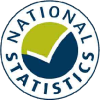Higher Education Student Statistics: UK, 2016/17 - Qualifications achieved
- Summary
- Student numbers and characteristics
- Where students come from and go to study
- Subjects studied
- Qualifications achieved
- Notes
How many qualifiers from HE are there?
The total number of qualifications achieved in 2016/17 was 757,300. This was an increase of 2% in the number of qualifications achieved in comparison to 2015/16, ending the downwards trend seen between 2012/13 and 2015/16. The largest increase, both in absolute and percentage terms was amongst first degree qualifications. Not all levels of study saw an increase in qualifications gained between 2015/16 and 2016/17. The number of postgraduate certificate in education qualifications awarded dropped by 6%, foundation degree qualifications dropped by 8% and professional graduate certificate in education qualifications dropped by 20%. In the context of the EU, Eurostat published figures in November 2017 that reported the UK to have the second largest number of qualifiers from higher education in 2015, behind France (source: Eurostat).
Labour Force Survey data published by the Office for National Statistics (ONS) in November 2017 shows how UK Higher Education contributes to the skills level of the nation. In July to September 2017, 42% of the UK population aged 21 to 64 had achieved higher education qualifications (source: ONS).
In 2016/17, first degree qualifications accounted for 55% of all HE qualifications obtained in the UK and masters taught qualifications accounted for 22% (see figure 16).
Figure 16 - HE qualifications obtained by level of qualification
2012/13 to 2016/17
Please note that 'Other undergraduate' includes any qualification not listed above (see definitions for a full list of qualifications). 'Total other undergraduate' includes all undergraduate qualifications excluding first degrees.
Of those gaining a classified first degree, the proportion who obtained a first or upper second has shown a steady increase from 68% in 2012/13 to 75% in 2016/17. In 2016/17, 26% gained a first class degree compared to 18% in 2012/13 (see figure 17). There were regional variations in the proportions obtaining first or upper second class degrees, with 78% achieving these awards from HE providers in Scotland, but just 71% from HE providers in Wales. Variations in class of first degree were also apparent by mode of study and sex. Just 54% of first degree qualifications achieved through part-time study were classified as a first of upper second, compared with 76% achieved through full-time study. A higher percentage of female first degree qualifiers achieved a first or upper second class degree in 2016/17 (77% compared to just 72% of male qualifiers).
22,470 students qualified with an unclassified first degree. This mainly includes degrees that don't have a classification, such as Medicine.
Figure 17 - Percentage of first degree qualifiers obtaining each classification
2012/13 to 2016/17
Figure 18 shows that in 2016/17, the highest number of qualifications gained were in Business & administrative studies (17% of all qualifications), followed by Subjects allied to medicine and Social studies. Business & administrative studies was the subject with the most qualifiers at first degree and postgraduate taught level, but at postgraduate research level, the highest number of qualifications gained were in Biological sciences. Amongst other undergraduates, the highest number of qualifications gained were in Subjects allied to medicine.
There has been a notable decline in the number of qualifications gained from Education subjects since 2012/13. This decline has coincided with an increase in the numbers of teachers qualifying through school-led routes, as shown in figures published by the Department for Education.
Figure 18 - HE qualifications obtained by subject area and sex
2012/13 to 2016/17
Show last:
There were variations in the percentage of qualifiers who gained qualifications in Science subjects by age. In 2016/17, just 39% of qualifications achieved by those aged 20 and under were in Science subject areas, compared with 45% of those aged 30 and over. Between 2012/13 and 2016/17 there was a decrease in the percentage of UK domiciled qualifiers with black ethnicity gaining qualifications in Science subjects, although this decrease all happened at other undergraduate level. Of UK domiciled black other undergraduate qualifiers, 58% gained Science subject qualifications in 2012/13, compared to just 46% in 2016/17.
Figure 19 - Percentage of HE student qualifications obtained in science subject areas by personal characteristics
2012/13 to 2016/17

Embargo
11 January 2018, 9:30
Coverage
UK
Release frequency
Annual - view all releases (1998/99 - onwards)
Pre-release access
View pre-release access list for this release
Themes
Children, education and skills
Issued by
HESA, 95 Promenade, Cheltenham, GL50 1HZ
Press enquiries
01242 211120
Public enquiries
01242 211133
Statistician
Rebecca Mantle




